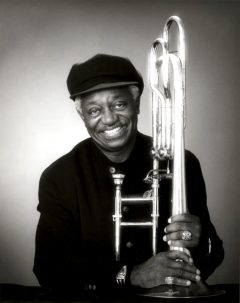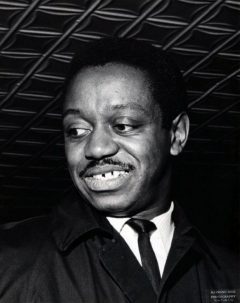Yesterday And Today
Enlistment Blues: How I joined the Army, met Lester Young and Jo Jones, and found a career in jazz.
Jimmy Cheatham’s memoirs of life in the Army during World War II as told to Jim Trageser, Part Two.
In the meantime, we were doing our training and took a break and the company commander came over and talked to me, you know, like what I wanted to do with my life and all that stuff. And he got to like me due to a bayonet exercise that we had to go through. In this exercise, he picked me for an example to show them what has to happen because he observed me going through the exercise. In going through this exercise, all I had in front of my eyes was that little sergeant! He said, “Look, this is no little kind of plaything. Because when you pull a gun, you gotta use it. And when you pull your bayonet, you’d better use it! You’ve got to come to grips with having to stick a person. You gotta stick ‘em with a thrust, and then you put your foot there and bring it out. You can’t leave it there, because somebody else is coming at you at the same time.” I mean, they went through the whole thing. And you go through your dummies, the whole bit. So, he was observing me going through this. After the initial exercises he had me step forward a couple of paces front and center. He said, “Now, I want you men to see this young man deal with the bayonet. With all my training, I’ve never seen anybody look as fierce.” So he put me through the paces. He really dug my moves, because I was an athlete and I was in fantastic shape. I had no fear, in terms of my body. I could do anything I wanted with my body. In terms of my mind, I’d picture it and do it.
That incident was what set him up to try to motivate me to become a career soldier. He said, “You’re a natural leader.” He started going through all these things while we’re taking a smoke break. And I would tell him, “Look, my thing is music. I believe I can really serve my country better playing music and helping to heal souls and keeping morale up.” He said, “Well, you’re right about that. The thing is, you can have an effect on the motivation on so many soldiers because you have the ability.” He said, “If you work with me, I’ll see that you can get into officers candidate school.” So that was the payback. Officers candidate school for a black? Wow! That’s something else. I said, “Well, that sounds awfully inviting. But it’ll take a lot to move me away from music.” He said, “Well, we’ll see.”
I didn’t realize that the little sergeant had told my company commander about my joining the band after my 13-week training. The group I was with was selected to become part of the 93rd Division and was supposed to go from there to Louisiana for the big maneuvers and then from there to the South Pacific. What happened was, when I finished my 13-week training, I got my orders to go to the rail head and ship out. A dispatcher came up on a motorcycle and handed the company C.O. something. He called off names and I was included. I was held over to go to cadre school, which was the first step to going to noncommissioned officers’ school. And I found out that the second order had come down for me to join the band from the colonel. But, the order for me to go to cadre school came from the general of the post. And if you get two orders or three orders at the same time, the highest prevails. My company commander put my orders for cadre school through the chain of command, and that’s how I found out about shooting my mouth off! So I learned how to keep my own counsel.
That same mean little sergeant revealed that to me. “See, thought you were gonna get in the band, huh? But your ass is saved anyway, because at least you’re not going in the 93rd to Louisiana, then wind up in Bougainville somewhere.” I found out that, in a way, that was part of his act. As soldiers, we had mutual respect. As a result of all this, I became an acting sergeant when we got back to the company. So here I am, assisting him in training men in the short span of time before going to cadre school. That’s when me and the sergeant settled things. He said, “Just because you’re acting sergeant”—a black band with three stripes—“don’t think you’re Mr. Hot Shit.” I said, “Look, I swallowed all your bullshit for 13 weeks.” I said, “I’ve had it up to here. Now, all I ask, meet me behind the latrine with your shirt off, unless you’ve got your stripes tattooed on your ass. We’re gonna settle this once and for all,” I said, “because I’m not gonna work with you like this. We’re gonna find out where it is and that’s that and then we’ll be able to work together.” So we did. Oh, we hung it out. But with my rigorous training, just like his, I was ready for him. Because I was determined! And I was much quicker; I knew that. I did everything but follow through with dirty fighting. But we got that all settled.
Then, here I am over in cadre school. I’m out of my regular area and going into a special highly secured patrol area. Same post. Still at Fort McClellan. I was going through all this extra vigorous training. Then another captain came in from the South Pacific. This was where that highly skilled training came in in terms of jungle warfare, because they’d never had that before, see? So, I was like in the first echelon of soldiers being trained for that. And that was where the word “dirty fighting” came from, before the Green Berets.
Cadre school was about six weeks. Intensive, though—everything that you’ve seen that these guys go through rigorously. You’re jumping off towers, hitting 10-foot walls, all that stuff. This was all, in comparison to many others, very easy for me because being the athlete I was in high school it was a continuum. I ate it up.
When we got into the jungle warfare, what you call the dirty fighting, this was where you were taught how to pop eyeballs out and how to count change, everything: biting, scratching, the whole bit. Then, your reflexes naturally become so sharp that you can hear the least little noise other than what you’ve become acclimated to; anything strange you were ready for it.
I did guard duty one night. We’d been through all the training about being challenged and what not. This combat-experienced captain came up to my post. We went through the whole thing: Who goes there, advance and be recognized. Alright, don’t move another step, that’s far enough. Ask for an ID and all that. And he raised his hands. Anyway, he was testing me out while he was doing that. He was doing something that was revealed to us later. When you say, “Raise your hands,” you have a tendency to look up. And as you’re talking to him—this is night, see—he’s inching forward. And if he gets close enough, he’ll disarm you. I was checking him out. The whole time, I looked him right in the eye. I would never look at his feet or anything like that. When he bent down, I said, “Straighten up!” And when he straightened up, I was still looking him right in the eye. So, I was ready for him. He finally made his move. And when he made his move, I just stepped aside and with one butt stroke I had him on the ground with the bayonet right at his neck! After that, he said, “All right, you’re a good one!” He said, “With you in my unit, I know I got good backup.”
I took advantage of my training and did some reconnoitering and found out how to get out of that security area, which I did. One night, I sneaked out. I could have been washed out of the program, really, it was that severe. I went to the band room and told them, “I’m graduating on such-and-such date,” and they checked their schedule and found, “Yeah, we’re playing that ceremony.” I said, “Great. Would you kindly have them send the orders down for me on that date?” And they said, “Don’t worry about a thing!” I cut back to the area and fortunately got back before bed check and all that.
At graduation, I got my diploma. At the ceremony, the band’s playing and when they call my name I squared off, saluted, made a sharp left—the band’s on that side — and marched back. Master Sgt. Lewis was conducting the band and he looked at me and winked! I said, “Oh, shit!” He let me know it’s there. And sure enough, man, this time I was cool! I kept all my joy inside me. I went back to my cadre headquarters. We gathered up all our personal gear to return to our respective companies. I got back to my company and just set my duffel bag down and immediately went to our headquarters. I asked the administrative sergeant, “Would you mind checking to see if there’s a letter come down on me?” He said, “Oh sure,” and there it was. I said, “Yeah.” I said, “Can I have them now?” He said, “Legally, no. But you don’t have to worry about a thing. I’ll make sure it gets in the right hands and you really get those orders.” Sure enough, when the C.O. came, I could almost hear him cursing from my barracks. I came in, saluted him and everything, and he said, “I’d like to present you with your orders to join the band.” I said, “Thank-you sir” and gave him a grand salute.
Even after cadre school, I wasn’t a sergeant though. I had been busted! I was instructing recruits how to build slit trenches and fox holes, which are two different holes for protection. In doing so, I was getting down there and demonstrating and working with them to show them how. My commanding officer happened to come around at that time and he said, “What are you doing down there? You’re not supposed to be down there; you’re supposed to be telling them what to do.” “Well, sir, when that flak is flying it doesn’t go around me because I got some stripes on my arm.” He said, “Don’t get smart.” So he busted me for insubordination!
But I got to go to the band, so I didn’t care. But it took a year and a half, all of that, and then I got in the band in ’44. From ’44 to ’46 that’s when I got my discharge—we did war bond tours and all kinds of things.
I was with the same unit throughout the war. During the transition from ’44 into ’45, we became an assigned band from the adjutant general’s department in Washington, D.C. And we became known as the 173rd AGF Band, which meant 173rd Army Ground Force Band, so we became an official Army band, which still exists today as far as I know.
Final installment to be continued in the July issue of the San Diego Troubadour.












